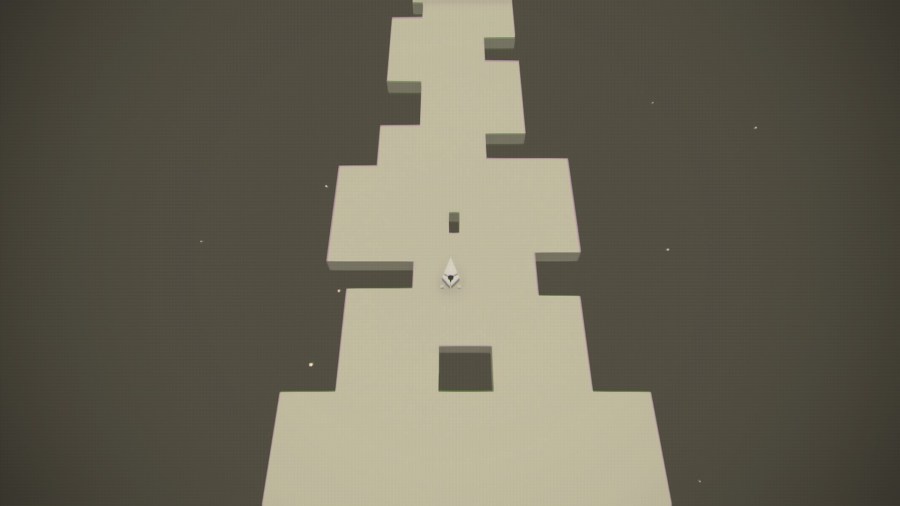Wondering how to get started on games criticism? This week’s writing happened to feature some great overview articles that give readers an introduction to specific topics, as well as deeper dives on particular games.
Erode symbols
It’s a great time for writing on games and architecture right now, and this week has two treasures in that field.
- An Empty Artifice | Nier Automata | Heterotopias
Devin Raposo’s short essay on space in Nier Automata is illustrated by some striking images. - Modeling Spatial Game Design with Pinball | vextro
leeroy lewin discusses simulation, representation, and possible futures for video games.
Consider a third school of thought. An application of game development that is defined basically as neither representation nor simulation. Game development eroding symbols, eliminating context, channeling the nether.
Feel truly alive
A number of pieces this week are overviews of existing work on a topic, or of useful terms for making sense of something. These two concern what it feels like to play games.
- An Incomplete Game Feel Reader | Brendan Keogh
Brendan Keogh surveys the heritage of “gamefeel” and related concepts. - Moral Game Design – Charles Hans Huang – Medium
Charles Huang provides a useful list of keywords for game aesthetics and values.
Games can bring forth many kinds of emotions, but there are a few that move beyond the cheap thrills, titillation, and all flash but no substance— there are a few that might speak to (or at least have the ambition to speak to) the core of what it means to be alive. Even if a game doesn’t necessarily bring us something useful per se, it might be able to speak on a level that calls out to our humanity and make us feel truly alive.
From voyeuristic to sympathetic
Another survey article is found in this section, this time on empathy, followed by a single concrete example of how empathy in games might work.
- Game Design Aspect of the Month: VR: the Ultimate Empathy Machine?
Sande Chen summarises recent research that complicates the idea that simulations can provoke empathy. - Inhabiting Another: Becoming Through A Normal Lost Phone – Not Your Mama’s Gamer
Alisha Karabinus finds that empathy can be provoked by being asked to perform the role of a strange.
It’s a powerful way to design an empathy game. Without thinking, the player begins to relate to the phone’s owner, even if that experience is so far outside of their own as to be difficult to understand. Slowly, the player moves from voyeuristic to sympathetic, and it happens naturally, as the game progresses.
Listen to a different song
Community organization and management were looked at this week using quantitative data and investigative journalism.
- Gamasutra: Nick Yee’s Blog – Competition Is Not The Opposite of Community
Nick Yee shares some very helpful data on user motivation and critiques the common separation in player types made by other quantitative researchers in this area. - What It’s Like to Curate an Indie Gaming Event – Waypoint
Jake Tucker does an interesting thing here in identifying games curation as a separate scene and audience – while also giving a great summary of the main curation efforts being carried out in the UK.
There’s a variety to the games curation scene that is distinct, absent from other aspects of video games. Which is not to say that curation like this is about replacing the wall of noise triple-A produces; rather, it’s encouraging you to listen to a different song once in a while.
Hard shadows
Technical investigations into games are a common part of the writing scene, but it’s rare for them to be a form of criticism in themselves.
- Gamasutra: Josh Bycer’s Blog – 4 Ways that the Souls Series Stays Accessible to All
Josh Bycer succinctly identifies some of the design strategies that have made Souls games so influential. - Mass Effect: Andromeda and the quest for great facial animation • Eurogamer.net
Alex Wiltshire’s report on the state of the art in character animation is enlightening, putting players’ disappointment in perspective. - Radiator Blog: Lighting theory for 3D games, part 5: the rise and fall of the cult of hard shadows
Robert Yang’s history of shadow casting technology is deeply engaged in the technical reality of graphics engines, but refuses to be seduced by them.
[W]e sacrificed entire levels, rooms, and hallways, to feed the shadows and our notions of high craft and perceived production value. But let’s not stop there! What if you sacrificed an entire game just to render cool-looking hard shadows?
Serve a purpose
Trans representation in Mass Effect: Andromeda has been a source of irritation for many, who found it hamhanded and shallow. These two pieces go a long way towards explaining the problems to anyone unfamiliar with the arguments at hand.
- What’s in a Name?: Mass Effect: Andromeda and Inclusion – Not Your Mama’s Gamer
Lee Hibbard makes clear what the problem is with the trans representation in the latest Mass Effect game. - Mass Effect Andromeda is another failure for trans representation • Eurogamer.net
Sam Greer compares the trans characters in two Bioware games, showing that a big part of representation is preparation.
In a blog post discussing the creation and writing of Krem, Patrick Weekes notes: “A minor character like a shopkeeper would have no reason to explain that she is trans […] the character had to serve a purpose beyond ‘being there to be a genderqueer person.'” It is a shame this sentiment wasn’t shared by the writers working on Andromeda.
The other freedom
The representation and performance of resistance to powerful institutions was examined by three writers this week, taking up the topics of media fandom, religion, and counter-play.
- Retro City Rampage | Something in the Direction of Exhibition
Vincent K. examines the myriad failings of a parody or satire that lacks a critical edge. - Ikkin Investigates: Christian Symbolism in FFXV – YouTube (video, auto-captions)
Ikkin points out that the latest Final Fantasy treats religion very differently to its predecessors. - Free Roaming — Real Life
Robert Minto explores the thrills of misbehaving in games, and the particular feeling of freedom that requires a tyrant.
The freedom game designers seem to want for me and the freedom I want to seize from them are radically different. One freedom concerns choice. […] The other freedom concerns autonomy. […] The first freedom requires a world built to accommodate it, a sumptuous palette of sanctioned choices; the second freedom depends upon a world it can defy.
Subscribe
Critical Distance is community-supported. Our readers support us from as little as one dollar a month. Would you consider joining them?
Contribute
Have you read, seen, heard or otherwise experienced something new that made you think about games differently? Send it in!






